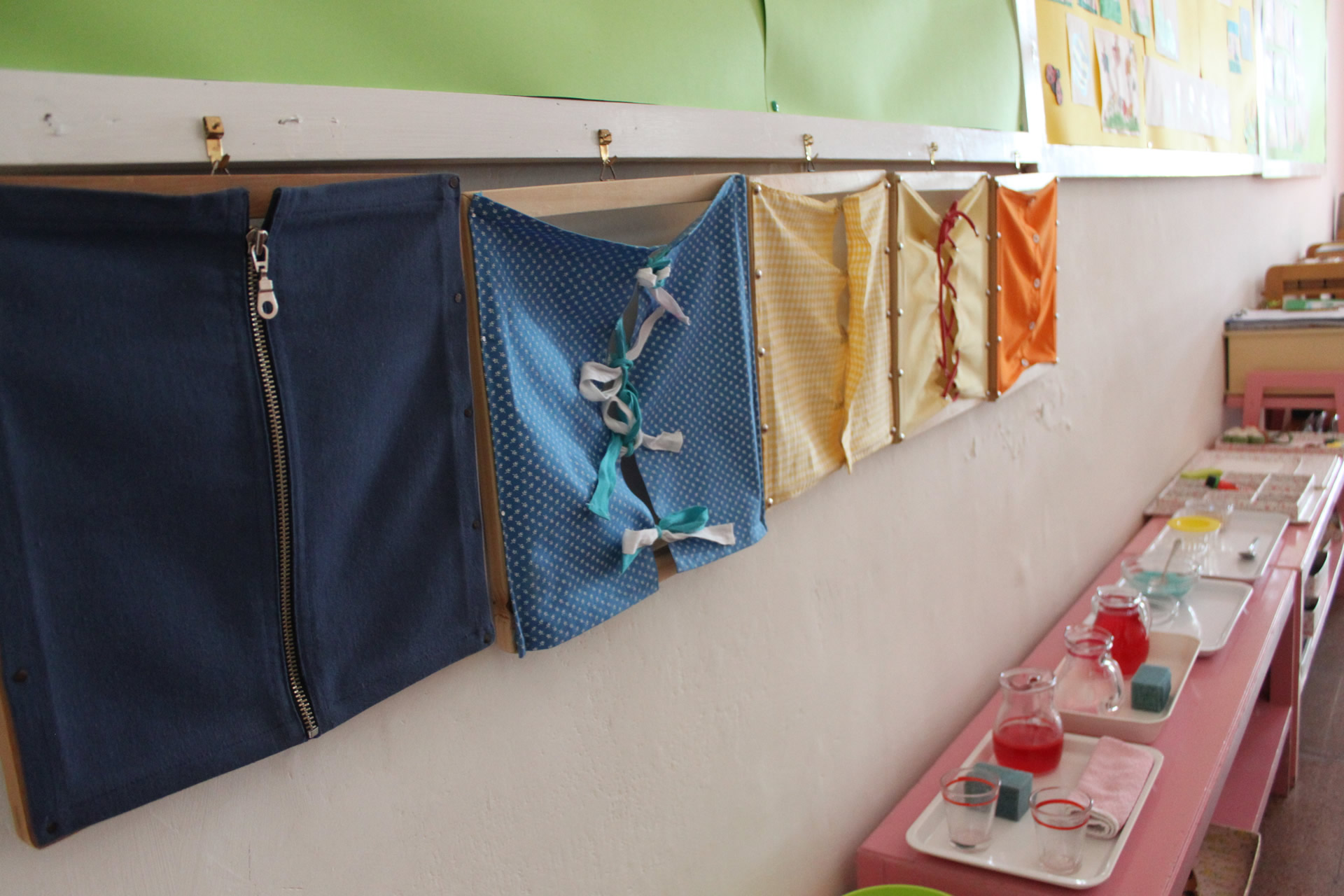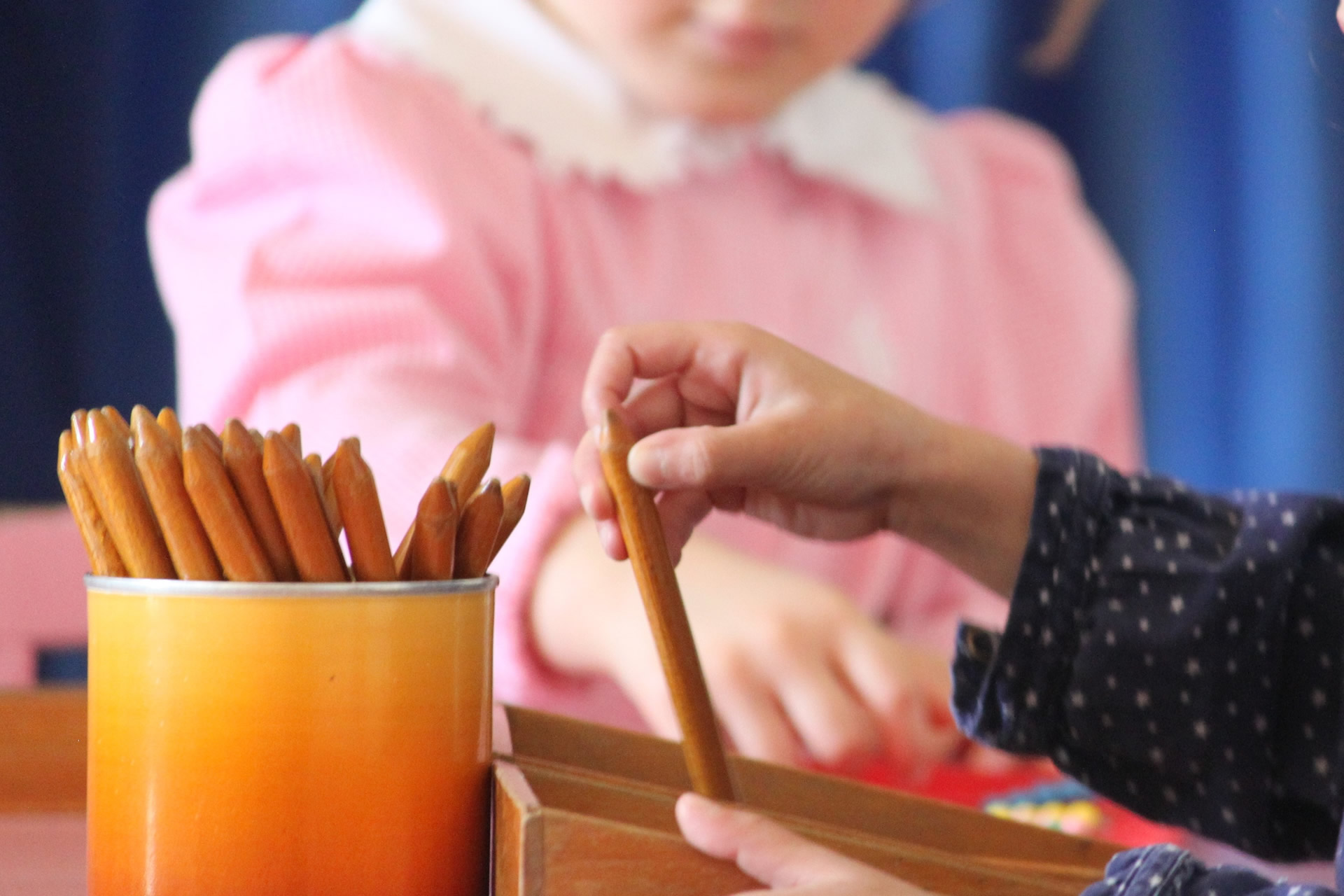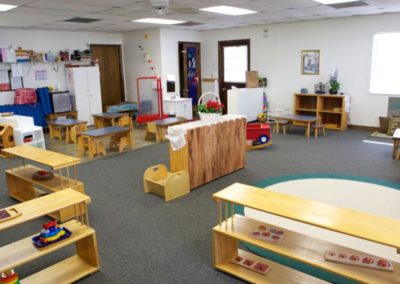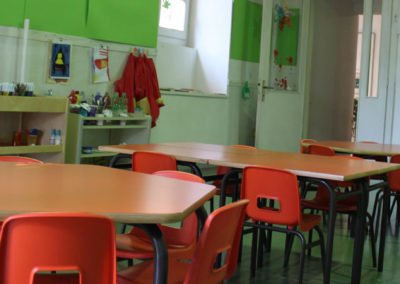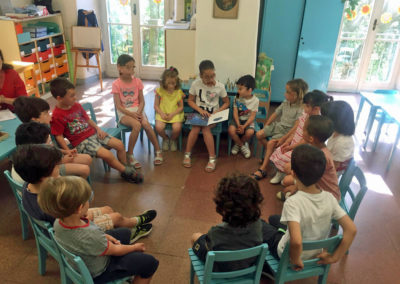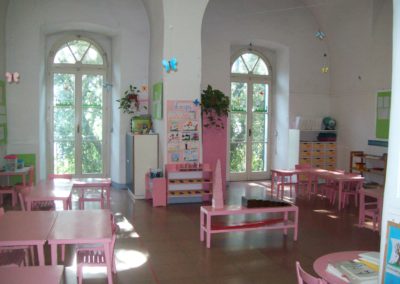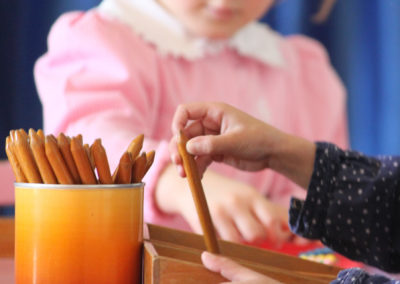
“It is the child who makes the man, and no man exists who was not made by the child that he was.”
Maria Montessori
A ground-breaking classroom.
A pilot program for children ages 2 – 6.
The Maria Montessori Experimental Classroom
Beginning in the scholastic year 2019/2020, Santa Croce Preschool launched an experimental, blended-age pilot program, designed to unite within a single classroom a group of children in the 24 – 36 months with a group in the 3- 6 years age range. This fledgling program was conceived with an aim to blending these traditionally separated age groups while continuing to lay the foundations of the basics of education and of cultural literacy for both, and it has been established within the historic setting of the Montessori Experimental Classroom, the innovative observational classroom designed and built under the supervision of the Doctor herself in 1950.
The first years in the life of a child are of decisive importance for the future development of the individual. In this very delicate period, fundamental human faculties such as movement, language and autonomous thought are acquired. For this reason, according to Dr. Montessori, the first years of a child’s life are of critical importance; they are a “period of creation” of personality, attained through the development of cognitive skills and through experiences and interactions with one’s environment. It is this age in which the foundations of the future adult are laid.
The mind of a child from birth through year 6 is very different from that of an adult; Dr. Montessori defines it as the “absorbent mind,” in that it possesses an extraordinary capacity to subconsciously absorb the various elements present in the life of the child. It allows the child to “incarnate,” or rather to assimilate, the input she receives from her surroundings (behaviors, norms, language), and this occurs without the child’s conscious effort, but by simply ‘living’; that is to say, these impressions are acquired through direct experience. The child acquires them subconciously, without an exercise of will: she learns, without ever having consciously decided, “I want to learn.” The child internalizes the impressions made by her surroundings upon her psyche, and what she absorbs is fixed indelibly upon her personality, influencing her for the rest of her life.
The fact that a child’s mind possesses this remarkable capacity to absorb the impressions that she receives from her environment does not mean, however, that children are passive creatures; children assimilate not so much that which they encounter passively, as that in which they actively participate, in the course of their own spontaneous activity. The absorbent mind is in fact “creator,” which means that children are psychically active beings who interact with their surroundings, and whom, through life experience, are able to achieve the acquisition of complex concepts (such as language) and ultimately to fulfill their potential. The early childhood years are therefore considered by Maria Montessori as a veritable golden age, i.e., as the period of the creation of the foundations of character, intellect, and personality.
The experimental classroom and a carefully prepared environment
The experimental classroom will be established as a permanent, working laboratory dedicated to research, innovation, interaction and exchange with other scholastic institutions; it will be a learning environment open to children between the ages of 2 and 6, and it will be conducted with full respect for the natural speed and the style of learning of each child, as every child possesses his own “biological clock,” his own rhythms and pace of learning.
The experimental classroom has been conceived of as:
- A child-friendly environment, built to a child’s scale
- An environment, managed by the children themselves, in which there is a place for everything and everything is in its place
- An environment for learning and for play (play-learn)
- An environment for observation and for exploration
- An environment for getting to know one’s self and others
- An environment for self-expression and communication
- An environment that encourages autonomy of action and of thought
- An environment that promotes the development of powers of concentration
- An environment for acquiring the first notions of cultural literacy

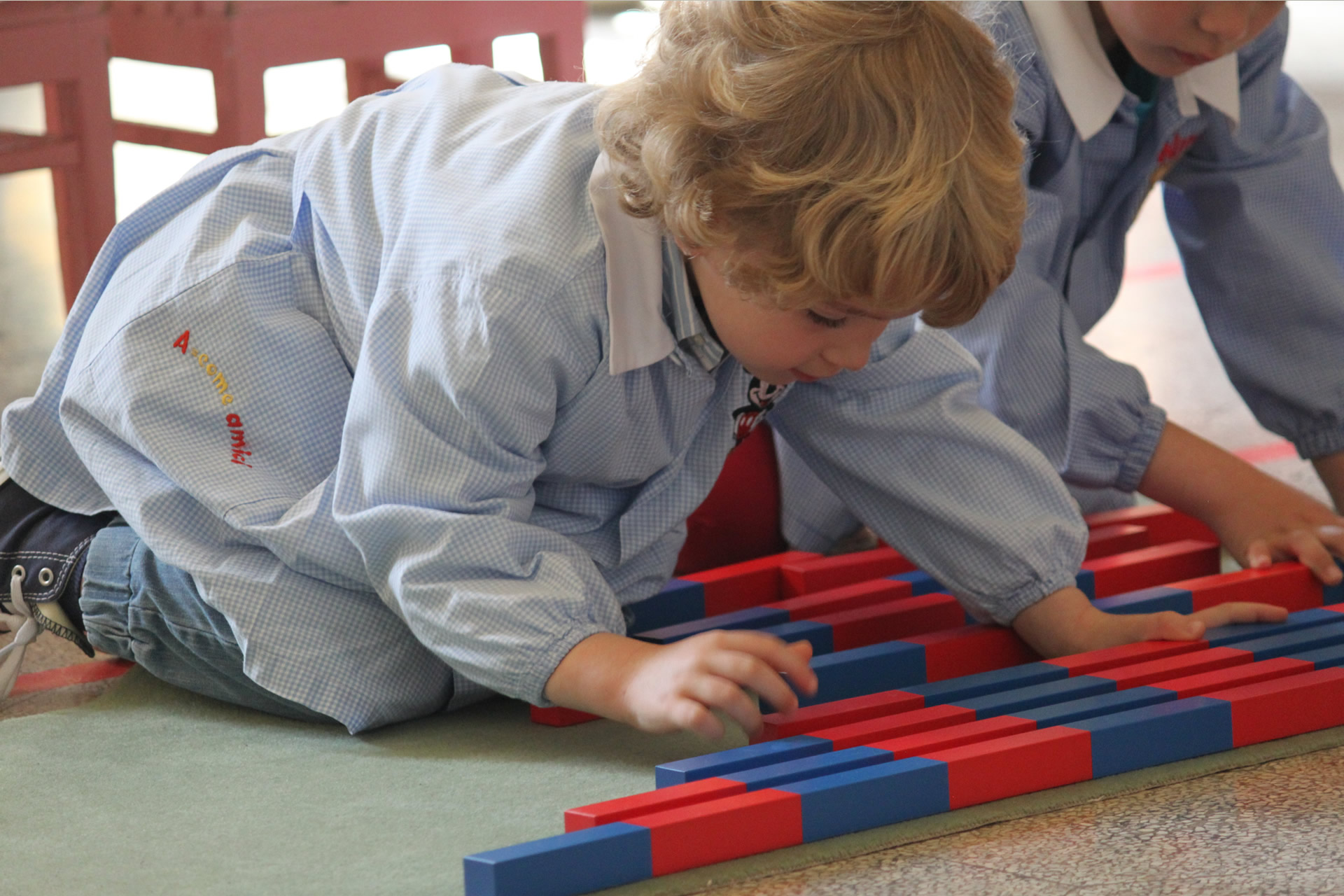
The carefully prepared environment of the experimental classroom will feature the following characteristics. It will be:
- APPEALING
- PROPORTIONATE
- ORDERLY – SIMPLE – HARMONIOUS
- CALM – REASSURING – GRATIFYING
- FREEING
The environment will be organized in separate work zones, arranged by theme, and must hold as its guiding principle the Montessori precept “Help me to help myself,” in order to encourage the child’s acquisition of autonomy.
The experimental classroom will be furnished with:
- real, functioning objects, made in soothing colors, which will be inviting to use and will stimulate a child’s desire to DO, rather than to pretend to do
- materials for the sensory exploration of various spheres in the development of the child: movement, language, logical-mathematical.
The materials and furnishings of the classroom will correspond to the strengths and abilities of children at various stages of development and at various ages, in order to encourage a child’s natural drive towards independence, and to fulfill the child’s need both to process previous experiences and to acquire new knowledge in an orderly and logical way.
The composition of the class
The class will be blended in regards to age, welcoming children from the 24-36 months range as well as those between 4– 6 years of age. The composition of the class will depend largely upon managerial and organizational conditions; it will be subjected to continuous evaluation in order to ensure the functionality of the group, and to prevent the creation of experiences either inappropriate to the age of the children or insufficiently aligned with the objectives of the didactic plan.
The supportive presence of the early childhood educator, the kindergarten teacher and a full-time assistant, along with the harmonious physical characteristics of the experimental Montessori classroom itself, will guarantee to each child a stable foundation of emotional support which will serve as a springboard in the pursuit of projects and experiences designed to meet the rhythms, interests and abilities of that specific group of children.
The program in the Experimental Classroom, although unique within the school, has not, however, been designed to exist as an insular environment to be held separate from other classrooms; rather it has been conceived of as an environment which will welcome and benefit from exchanges with other school groups, and will therefore be organized to allow for frequent sharing, communal activities and socialization with schoolmates of various ages.
Pedagogical coordination
In addition to the teaching staff, two pedagogical coordinators will also be frequently present in the classroom, charged with the task of:
- monitoring the educational and didactic professionalism of the teaching team. This system of supervision will guarantee to the educators/teachers continuous pedagogical support and additional resources in methodology, scientific knowledge and communicative skills useful to the construction of a harmonious educational environment
- accompanying the team in the task of planning, documenting, monitoring, and evaluation of the educational/didactic plan
- guaranteeing the functionality of the work team
- fostering comunication with and encouraging the participation of the families.

Observation
The Experimental Classroom will be an environment ideally suited to observation. By means of the balcony present in the classroom, it will be possible to observe “in the field,” i.e, to observe children at their work without posing interference. As far as the observation of children is concerned, Maria Montessori had insights and intuition of great significance, and was firmly convinced that the path to promoting the progress of scientific pedagogy lay in the study of a child’s spontaneous actions within the context of his natural environment. This insistence upon unobtrusive observation is one of the most notable elements of her pedagogical proposition, and is one of the aspects that most strongly contributes to keeping the Montessori method so fully relevant to the modern age.
The instructor, in the course of her observation of the classroom, will come into contact with a stream of information crucial to her preparation of the learning environment and to her planned course of work. If it’s true that at the core of education is the child himself, it is inadmissible to neglect to observe the child, or to fail to construct an educational plan built around his reactions to his environment. The work of every scientist begins with observation; the need to observe is born of the desire to find an answer to a question, it is born of curiosity. He who asks no questions accepts at face value his environment, and excludes the possibility of new discoveries. To observe is to mindfully examine, to consider carefully, the object of one’s attention. To observe is not merely to watch, but to see, through a deep and attentive lens, with an aim to discovering the strengths hidden within each individual child. The educator who desires to observe must develop a sense of critical awareness in order to avoid interpreting her observations through a prism of preconceived notions; she must have the ability to relate each single observation to the general context in order to understand.
If an educator keeps in mind that it is the child who is in fact the teacher, and that it is the child who will himself indicate when he is recptive to the acquisition of a certain skill, she must observe without judgement, without interpretation: this is an act of great humility, insofar as it permits the instructor to embrace that which she does not know.
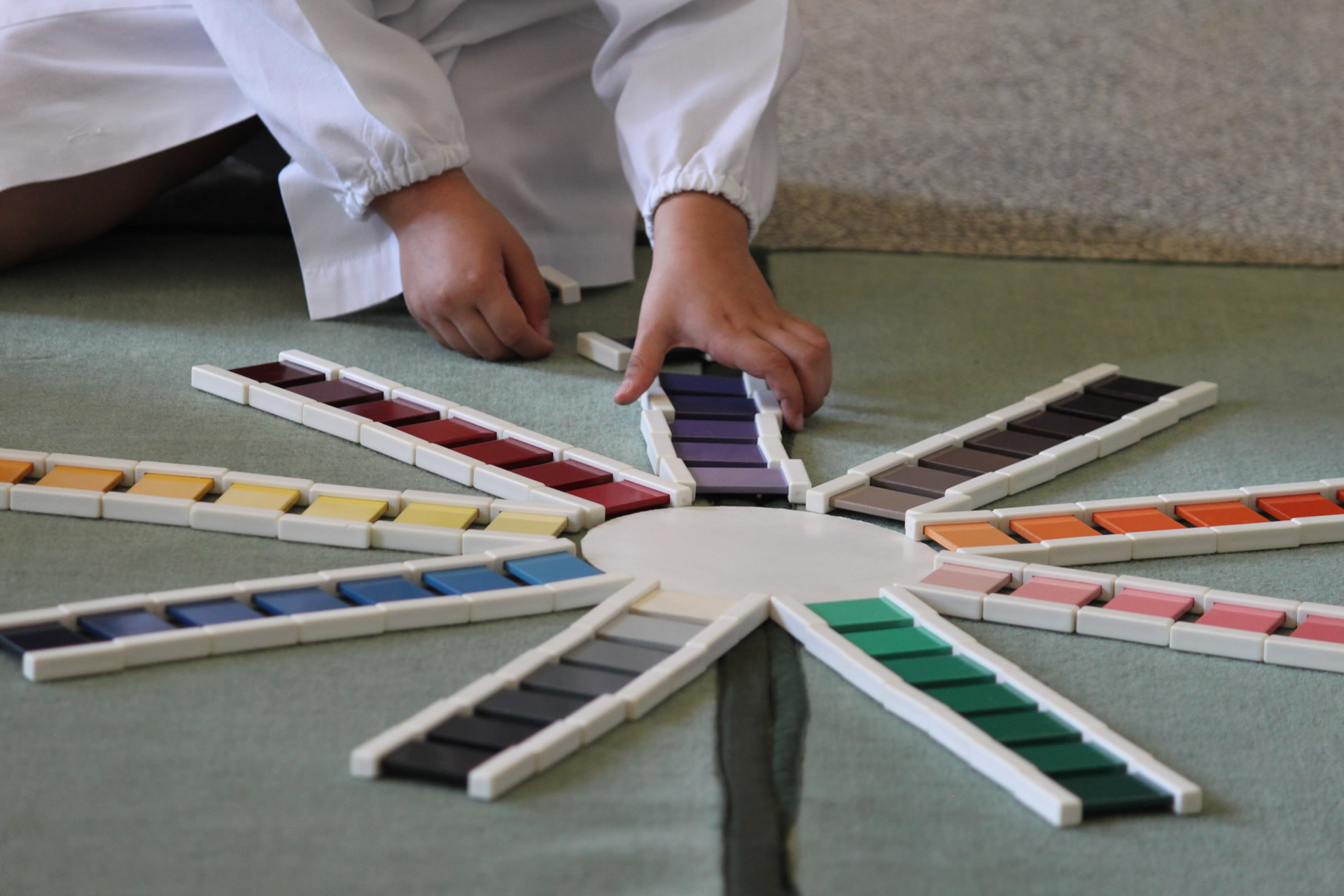
Perugia Montessori District
An urban and cultural concept aimed at strengthening and promoting awareness of the Montessori identity of the city of Perugia
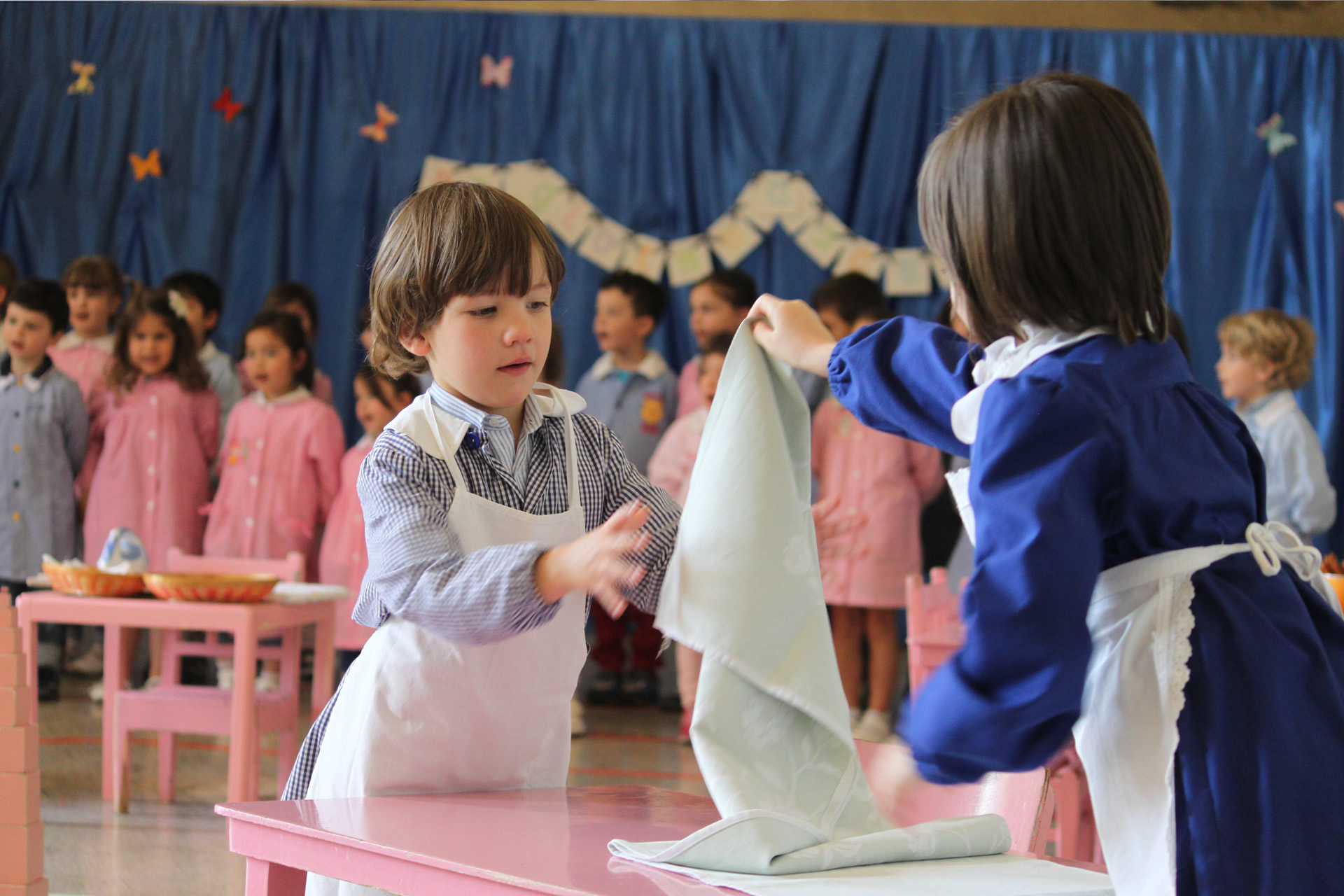
The Maria Montessori Experimental Classroom
The classroom conceived and designed by the Dottoressa of Chiaravalle herself for the observation of children at work
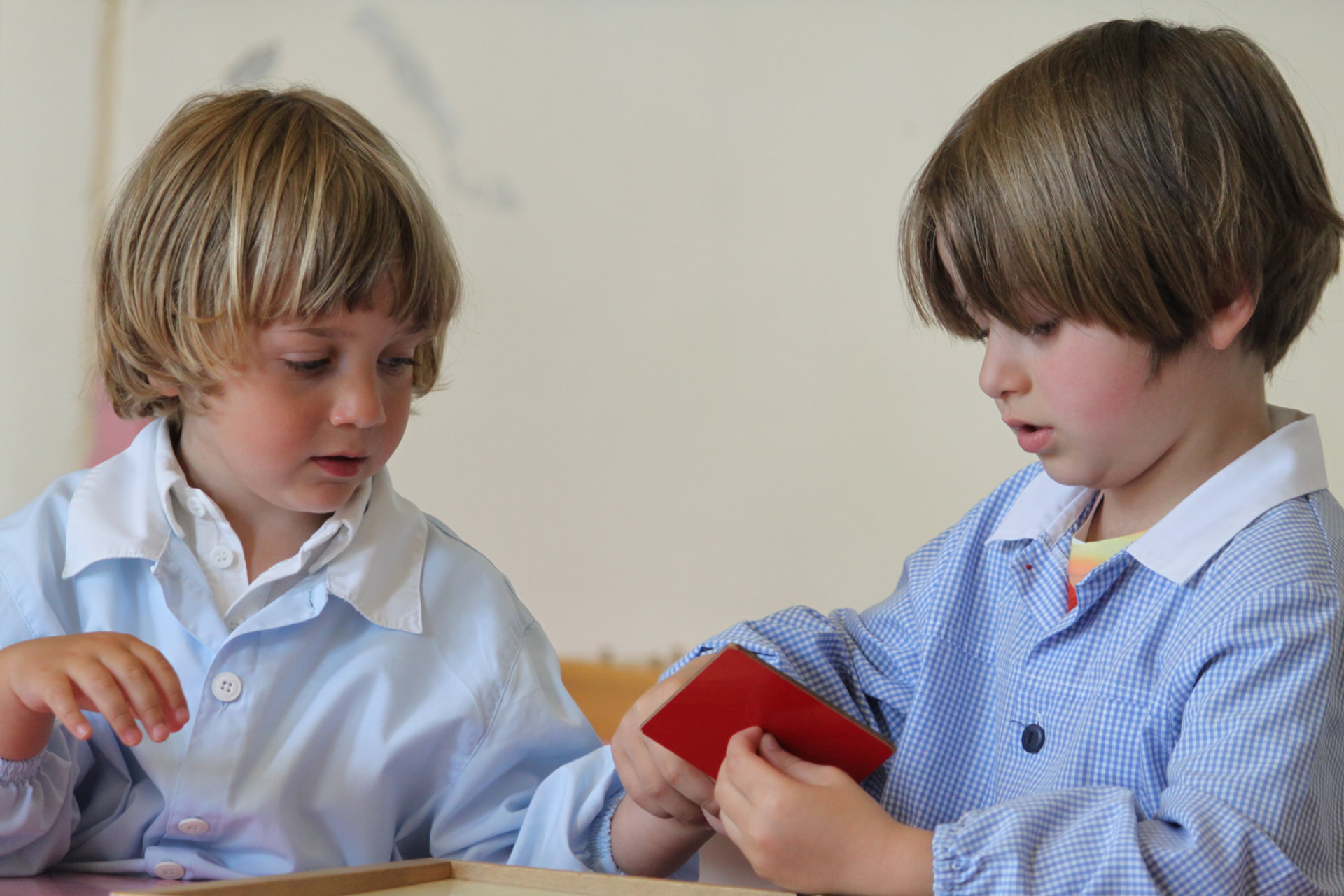
70th Anniversary Celebrations
Sixteen months of celebrations and events: The city of Perugia will be home to 16 months of cultural and scientific events which will distinguish Perugia as a place of particular significance within the span of Montessori history

